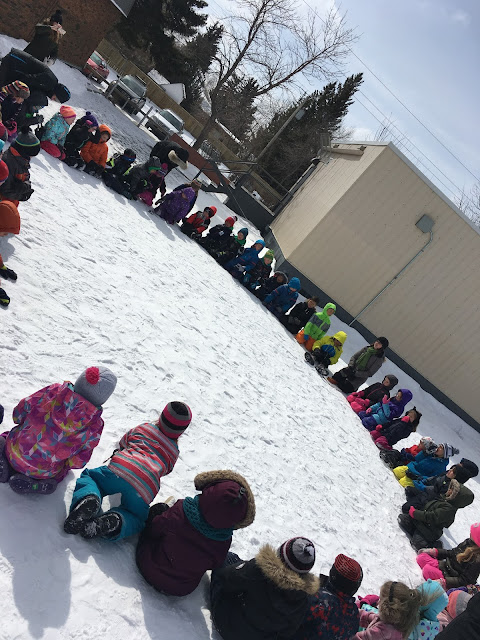We were invited to share our program with some eager Grade 1s and 2s today. April hasn't been nearly as Spring-like as we hoped. Still, there's no need to wait for warmer weather to learn to be citizen scientists!
We started the day trying to imagine what this land might have looked like 300 years ago. What was here before the school and homes were built? Who lived on this land and cared for it? We recognize that the school sits on the traditional homeland of a diverse group of First Nations: the Blackfoot, the Tsuut'ina, the Stoney Nakoda, as well as the Métis Nation. We learned, in particular, about the Chiniki people - one of the Stoney Nakoda Nations. Only three hundred years ago millions of bison roamed this land. For thousands of years the Chiniki relied on the bison for many of their basic needs. Their deep respect for the bison meant they used every part of the animal leaving nothing to waste. How would our world be different today if we could follow that example?
We played Who Am I? and created a food web by tossing yarn between any plants and animals that are connected. What happens to one affects all the others! And we're a part of nature too! We learned that the Chiniki people include all of nature as their relations. What if we considered the Chickadees our cousins, or the Spruce trees our brothers? Would that sense of relationship change the way we cared for the natural world?
Next we headed out on our Biodiversity Quest. So much is covered in snow. Would we see any signs of life?
Indeed! We saw more signs of life than we had time to discover in one outing.
 |
| Chickadees on an Aspen tree |
After a quick snack and hot chocolate break we treated the Grade 1s and 2s to a skit. Vanessa learns from her mom that looking for and counting birds for science can be fun! Going out and making bird observations can make a difference to conservation efforts! It's called Citizen Science. Even if at first it doesn't seem as exciting as adding to her Pokémon collection, she starts to catch the vision and gets hooked!
These students are so excited to get involved in Citizen Science! The natural world provides what we need for our survival every day. One way we can give back to nature is by participating in Citizen Science. We learned that the Chiniki people are taught that whenever you take something, you give back in return. Whether that means tying a cloth to a tree or leaving tobacco on the ground after harvesting roots for medicine, the act of giving back reminds us to treat nature's gifts with deep respect.
We headed back outside to play Nestling, Fledgling, Bird. Each ball in the centre represents a Citizen Scientists. Each team of birds needs to grab a ball before they're all gone!
Before we can head out to make our own bird sightings, we need to learn some introductory skills for identifying birds. Good citizen scientists need to be sure to submit accurate data! Even if it means you're simply a Magpie expert at first. You can start out as an expert on your one focus bird and then, if you keep your eyes open whenever you're outside, you'll start to notice and become familiar with many more birds.
We ended the day feeling grateful for the chance to be together and learn. We sat in a talking circle, which we found out is a special way of learning and listening together for the Chiniki people. The Eagle is a sacred animal to the Chiniki and their feathers are treasured. We passed around an Eagle feather and spoke about the things we learned today. Some memorable comments from the students included, "I'm glad I found out that I'm a part of nature!" and "I learned that we're all connected!". What a privilege it has been to learn together about nature today and some ways we can work together to protect it!



















Comments
Post a Comment